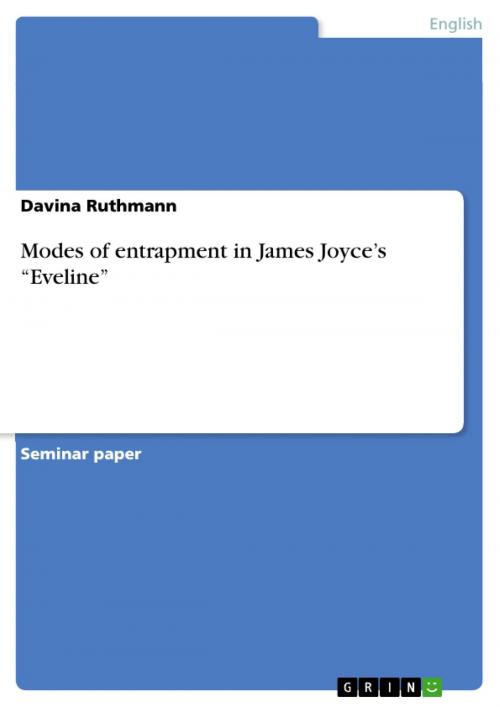Modes of entrapment in James Joyce's 'Eveline'
Fiction & Literature, Literary Theory & Criticism, British| Author: | Davina Ruthmann | ISBN: | 9783638861236 |
| Publisher: | GRIN Verlag | Publication: | November 19, 2007 |
| Imprint: | GRIN Verlag | Language: | English |
| Author: | Davina Ruthmann |
| ISBN: | 9783638861236 |
| Publisher: | GRIN Verlag |
| Publication: | November 19, 2007 |
| Imprint: | GRIN Verlag |
| Language: | English |
Seminar paper from the year 2005 in the subject English Language and Literature Studies - Literature, grade: 1,0, University of Wuppertal, course: Proseminar '20th Century English Short Stories', 9 entries in the bibliography, language: English, abstract: 'Eveline' is the second of James Joyce's stories that got published. First it appeared in the Irish Homestead in 1904 before being published as the fourth chapter of the Dubliners in 1914. It is Joyce's first attempt to write from the point of view of a woman. This young woman, having a dull job and 'leading a life of quiet desperation with a brutal father, is offered escape by a sailor' (Tindall 21). Although this offer seems very promising, Eveline does not manage to leave her home behind. Instead, she accepts a life full of frustration. To understand this inability and lack of courage one has to take a closer look at the environment surrounding her. 'Who and what is Eveline that her life [...] should be ending before she is twenty?' (Beck 111), is a valid quotation. We will see that Eveline is kept imprisoned in a cage made of tradition and subordination hard to break out. 'Eveline' is not a story of action but a narration taking place only in the protagonist's consciousness. Therefore the interest does not lie in the events, but in the reasons leading to the final decision. The story, like all Dubliners, shows Joyce's critical and melancholy view of life in his native town Dublin.
Seminar paper from the year 2005 in the subject English Language and Literature Studies - Literature, grade: 1,0, University of Wuppertal, course: Proseminar '20th Century English Short Stories', 9 entries in the bibliography, language: English, abstract: 'Eveline' is the second of James Joyce's stories that got published. First it appeared in the Irish Homestead in 1904 before being published as the fourth chapter of the Dubliners in 1914. It is Joyce's first attempt to write from the point of view of a woman. This young woman, having a dull job and 'leading a life of quiet desperation with a brutal father, is offered escape by a sailor' (Tindall 21). Although this offer seems very promising, Eveline does not manage to leave her home behind. Instead, she accepts a life full of frustration. To understand this inability and lack of courage one has to take a closer look at the environment surrounding her. 'Who and what is Eveline that her life [...] should be ending before she is twenty?' (Beck 111), is a valid quotation. We will see that Eveline is kept imprisoned in a cage made of tradition and subordination hard to break out. 'Eveline' is not a story of action but a narration taking place only in the protagonist's consciousness. Therefore the interest does not lie in the events, but in the reasons leading to the final decision. The story, like all Dubliners, shows Joyce's critical and melancholy view of life in his native town Dublin.















